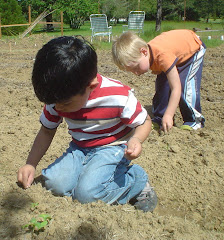 This is the time of the year when most of us are really craving some garden-fresh greens. Unless you have a greenhouse, or a cold-frame, it's probably been months since you've had raw, fresh greens (unless you like raw kale or beet greens...). Enter the delicious and nutritious sunflower sprouts! These are available for a premium price in some stores but with a few supplies, and a sunny window, you can grow your own!
This is the time of the year when most of us are really craving some garden-fresh greens. Unless you have a greenhouse, or a cold-frame, it's probably been months since you've had raw, fresh greens (unless you like raw kale or beet greens...). Enter the delicious and nutritious sunflower sprouts! These are available for a premium price in some stores but with a few supplies, and a sunny window, you can grow your own!As with all things related to gardening, growing sprouts is a cyclical affair. We begin with growing the flowers themselves. Most gardeners can manage to find space for a t least a few of these plant "sisters". They grow quite effortlessly providing a stately and regal presence as their faces follow the sun's path through the day (heliotropic is the name for this phenomenon). They are a perfect example of Nature's economy--each seed capable of producing many hundreds more of itself.

We always harvest our own seed from the previous year's garden but if you didn't do that, look at your local bulk foods section. You need to find raw and unsalted seeds, still in their shell.
(1) Start with a flat nursery tray, or other tray with drainage.
(2) Place a layer of newspaper on the bottom (to keep soil from falling through).
(3) Fill to about half with good potting soil, or 'potting mix'. Make the soil as level as possible, then lightly tamp down.
(4) Distribute seeds relatively evenly over the soil. The seeds should be touching each other and very little soil should show through but you don't want them layered much on top of each other. Probably about three cups of seeds in this size tray.
(5) Evenly spread more soil over seeds till they're thoroughly covered. You don't want any seeds showing through but it makes it easier to rinse off excess soil later if you don't overdo it.

(6) Place in a warm, sunny spot: a south window or greenhouse. If days aren't too chilly you can even put them outside.
(7) Keep them moist with a plant mister or spray nozzle on your hose.
(8) Sprouts are ready when they look like this picture.

Harvest just as soon as the second set of leaves appears, other wise they get bitter. Best to harvest them all at once.
(9) With your fingers, gently remove as many of the seed husks as possible. Using sharp scissors, hold a handful of sprouts with one hand and cut them off as close as possible to the roots.

(10) Place them in a large bowl and run cool water over them, gently swish them in the water to allow any remaining dirt to drop to the bottom. Lift the sprouts from the bowl and drain them in a colander or spin them in a salad spinner.
(11) Store in an air-tight container in the fridge. Use them up in 3-4 days.
Stay tuned to future episodes where we discuss planting, harvesting and saving sunflower seeds for next year's sprouts.












































